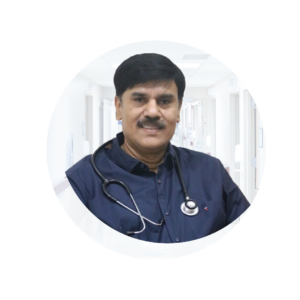
Do you need surgery for your hip?
Are you looking for the best hospital for hip replacement surgery?
Hip replacement surgery is a delicate procedure that should only be done by experienced surgeons in a top-quality hospital. Thousands of people are in need of hip replacement surgery but don’t know where to go. Sri Balaji Hospital is the best hospital for hip replacement surgery in Nolambur. We offer world-class treatment at an affordable price. Our hospital has a team of highly skilled and experienced surgeons who will perform your surgery with utmost care. Contact us to book an appointment today.
The hip joint is a ball-and-socket joint that allows for movement while also providing the stability required to support body weight.
The hip is one of the body’s most sturdy joints. However, because it carries your weight, it is more prone to developing arthritis due to the added pressure. Injury to muscles, tendons, or the little fluid-filled sacs (bursae) that cushion and lubricate joints can cause hip pain.

Dr.N.B.THANMARAN
ORTHOPEDICS &TRAUMA SURGERY
M.S.,FRCS.,DNB ORTHO.,D.ORTHO10.00AM-12.00 NOON/6.00PM-9.00PM
HOW DOES THE HIP WORK ?
This ball and socket connection works similarly to a car’s ball joint, connecting the wheel to the axle and allowing you to turn in various directions while maintaining body support. The upper end of your thigh bone (femur) has a ball (femoral head) that fits into a socket (acetabulum). The ball is covered with cartilage and the socket is lined with cartilage, allowing the ball to move freely in the socket. You only get one layer of this cartilage in your lifetime, and it cannot heal itself if it is damaged or worn out.
Depending on the origin of the condition, the location and degree of knee pain may vary. Signs and symptoms that sometimes accompany knee pain include:
- Swelling and stiffness
- Redness and warmth to the touch
- Weakness or instability
- Popping or crunching noises
- Inability to fully straighten the knee
- When to see a doctor
Call Your Doctor If You Experience Any Of The Following:
- If you’re unable to bear weight on your knee
- If you noticed significant swelling in your knees
- If you can’t fully extend or flex your knee, it’s time to see a doctor
- If you have a visible abnormality in your leg or knee
- In addition to redness, discomfort, and swelling in your knee, you have a temperature
- Have severe knee pain as a result of an injury
Hip arthritis is a condition in which the cartilage in the hip joint wears down or is destroyed, causing the joint’s bone surfaces to grind together and become rough. This produces pain and stiffness, making movement difficult.
Hip arthritis can take many forms, but they all include a loss of cartilage in the hip joint, which eventually leads to bone grinding on bone and joint destruction.
Osteoarthritis, the most common cause of joint degradation and discomfort, has no single underlying cause. There are a number of established risk factors that raise the chances of getting the condition. Aging is the most common cause of osteoarthritis. After decades of use, cartilage is likely to break down. Researchers have recently linked ageing to low-grade inflammation, theorising that it may induce or aggravate osteoarthritis. (By the age of 50 or 60, the majority of people exhibit indications of arthritis in one or more joints.)
For people with hip osteoarthritis, the most common symptom is pain. Hip arthritis pain is commonly characterised as being in the groin or thigh. Pain is frequently exacerbated by activity and alleviated by rest. It can happen at any time of day or night, and in severe situations, it might keep you awake. Patients with hip arthritis generally walk with a limp and experience stiffness in their hips. They may have trouble climbing and descending stairs, as well as putting on and taking off their shoes and socks.
There is no one test to identify it, however an abnormal X-ray with diagnostic signs such as constriction of the joint and spurring of the joint borders is frequently used. Your medical history will be taken, and a physical examination will be performed.
Nonsurgical treatments for hip arthritis – Nonsurgical approaches that reduce pain and disability include:
- Activity modification (reducing or stopping activities that cause pain)
- Weight loss (to reduce strain on the joint)
- Physical therapy
- Cox-2 inhibitors such as celecoxib(Celebrex)
- Corticosteroid injections
- NSAIDs (nonsteroidal anti-inflammatory medication drugs) such as:
- Ibuprofen (Advil)
- Naproxen (Aleve)
Surgery may be the best option for treating hip arthritis if non-operative therapies have failed to make a person’s condition bearable. The type of surgery a patient receives is determined by their age, anatomy, and underlying ailment.
Hip arthritis surgery options include operations that preserve the hip joint as well as those that fully rebuild it. They include:
- Hip preservation surgeries
- oint fusion (arthrodesis)
- Total or partial joint replacement surgery
- Maintain a healthy weight
Obesity puts additional strain on weight-bearing joints like your knees, ankles, hips, and back. You can limit the amount of stress on your joints and reduce your risk of joint damage by obtaining and maintaining a healthy weight. - Keep moving
Maintaining an active lifestyle can aid in the reduction of joint stiffness. During the day, you should walk around frequently and avoid being in one position for too long. When practising any type of exercise, you should take it carefully at first and use adequate safety equipment if necessary to safeguard your joints. - Stay strong
Your joints are supported and stabilised by strong muscles and bones. Strength training activities can help you strengthen muscles that maintain your joints healthy and fluid by including them into your routine. Walking or running, for example, are weight-bearing exercises that can help you keep strong bones. - Use correct posture
Proper posture can help to lessen the load on your joints and the risk of injury to the muscles around them. Maintaining good posture while performing repeated activities, sitting, and standing — especially when moving or lifting large objects — might help you avoid painful injuries or joint damage. - Don’t forget about diet.
Calcium and Vitamin D-enriched meals, such as dairy products and other fortified foods, can help to keep your bones strong. Omega-3 fatty acids found in fish like salmon and mackerel can help to lessen inflammation in your joints.
WHY THE Sri Balaji ORTHOPAEDIC JOINT REPLACEMENT TEAM?
The Joint Replacement Program at Sri Balaji Orthopaedic Institute is one of the best in the country, performing over 12,000 procedures per year. The Sri Balaji Institute’s joint replacement surgeons have extensive experience and training in total joint replacement. Each physician has completed additional sub-specialty training and skill growth in Fellowship programmes in addition to their rigorous residency training. Fellowships offer each surgeon with advanced knowledge and expertise in their chosen subspecialty.
HOW DO I KNOW IF JOINT REPLACEMENT IS RIGHT?
The hip pain and the stiffness of joint degeneration may be worse during certain times of the day, or after certain activities such as:
- Walking
- Climbing stairs
- Getting on and off a chair
- Putting on shoes and socks
- Walking on uneven surfaces
- Sexual activities
- Getting in and out of a car
Individuals with arthritis may also feel uncomfortable with pain while resting, sitting in a chair, or lying down. Sometimes it makes it difficult for individuals to care for themselves. When joint pain is severe enough that it interferes with daily activities, work and sleep, joint replacement may be an option. The decision to replace your hip is made by you and your orthopedic surgeon mainly based on the degree to which the pain is affecting your life. The hip pain and the stiffness of joint degeneration may be worse during certain times of the day, or after certain activities such as:
- Walking
- Climbing stairs
- Getting on and off a chair
- Putting on shoes and socks
- Walking on uneven surfaces
- Sexual activities
- Getting in and out of a car

Sri Balaji Hospitals is a 35 bedded Multispeciality hospital located on the highway in Nolambur Chennai.
Contact Us
+91 7200071640
+919150779806
sbhreception@gmail.com
Sri Balaji Hospitals (A Unit Of Sree Jaya Surya Hospital Private Limited) No;318/3b2 Chennai By-Pass Service Road , S.R.R Nagar. Nolambur. Chennai-600037
©2023. The Right Hand. All Rights Reserved.
